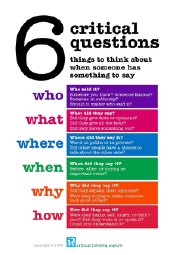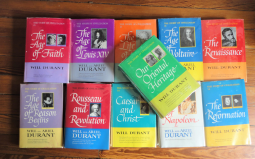
R: 0 / I: 0
>To become a better critical thinker, you therefore need to learn how to:
>1. clarify your thinking purpose and context
>2. question your sources of information
>3. identify arguments
>4. analyse sources and arguments
>5. evaluate the arguments of others and
>6. create or synthesise your own arguments.
https://www.monash.edu/student-academic-success/enhance-your-thinking/critical-thinking/what-is-critical-thinking
Critical Thinking
>Critical thinking is a kind of thinking in which you question, analyse, interpret, evaluate and make a judgement about what you read, hear, say, or write. The term critical comes from the Greek word kritikos meaning “able to judge or discern”. Good critical thinking is about making reliable judgements based on reliable information.>To become a better critical thinker, you therefore need to learn how to:
>1. clarify your thinking purpose and context
>2. question your sources of information
>3. identify arguments
>4. analyse sources and arguments
>5. evaluate the arguments of others and
>6. create or synthesise your own arguments.
https://www.monash.edu/student-academic-success/enhance-your-thinking/critical-thinking/what-is-critical-thinking

R: 0 / I: 0
From "The Concept of the Political"
Carl Schmitt
"Thus the enemy is not a competitor or opponent in the general sense. He is also not a private opponent whom one hates with a feeling of antipathy. The enemy exists only when, at least potentially, one fighting collective of people confronts another fighting collective. The enemy is always a public enemy, because everything that relates to such a collective of people, especially to a whole people, thereby becomes public. The enemy is hostis, not inimicus in the broader sense; πολέμιος, not ἐχθρός.9 As the German language, like many other languages, does not distinguish between the private and the political “enemy,” many misunderstandings and falsifications are possible. The oft-quoted passage “Love thy enemy,” (Matthew 5:44, Luke 6:27) reads “diligite inimicos vestros,” ἀγαπᾶτε τοὺς ἐχθροὺς, and not “diligite hostes vestros”; there is no mention of the political enemy. Nor, in the thousand year struggle between Christianity and Islam, has it ever occurred to any Christian that out of love for the Saracens or the Turks, instead of defending Europe, we should hand it over to Islam. One need not hate the enemy in the political sense personally, and only in the private sphere does it make sense to love one’s “enemy,” i.e., one’s opponent. That biblical passage has even less to do with political enmity than it does with abolishing, for instance, the distinction of good and evil, or beautiful and ugly. Above all it does not say that one should love the enemies of his people and support them against his own people."From "The Concept of the Political"

